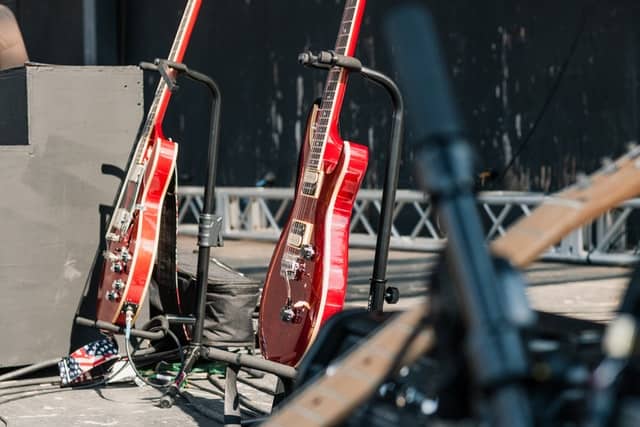You might have noticed that many bands use different tunings from song to song.
Perhaps sometimes it’s just going from standard to drop D, sometimes it’s half a step-down, and maybe on other occasions, they go for an open tuning.
Now, let’s say you would like to play those songs at home, but you only have a single guitar tuned in E standard.
What can you do about it?
Should you tune your guitar to different tunings as you need to use them?
Or should you get different guitars for different tunings?
Getting a dedicated guitar for each different tuning you use is a great idea since you could set up each instrument to play perfectly. However, this is expensive, and for beginners, it would be a better idea to upgrade their amp and pedals. Also, changing tunings often won’t damage your guitar.
In this article, I will go in-depth about the reasons behind artists having a dedicated guitar for each specific tuning, and why that could be a good idea or not for you.
After leaving this page, you will have a clearer idea about what’s the most reasonable thing to do if you like music that involves many different tunings.
Are you ready to get started?
Let’s go!
Is it reasonable to have different guitars for different tunings?
Having a dedicated guitar for each different tuning you use in your songs is a great idea, but also a luxury in most cases.
You see, if you are just starting out and you use, say 3 different tunings regularly, the idea of having to buy 3 different guitars might be appalling, not for you, but for your wallet.
Also, I consider it a better investment to get a high-end amp and set up a great pedalboard, before pulling the trigger on other guitars.
But I know how we guitarists are…
So, to sum things up: If you have the budget, and you already sound great, by all means, getting a guitar for each tuning you use would be the most practical thing.
Now, if you are an intermediate player, and you haven’t settled on your ultimate sound yet, perhaps it’d be wiser to invest in an amp or effects.
Reasons to have a guitar for each tuning you use
The main reason for having a guitar for each tuning you use is practicality. You just grab a guitar and play. No tuning, no retuning, no dealing with setup issues.
And on that note, remember that if you go for lower tunings without changing the string gauge, the feel of your instrument might be completely altered. Strings will feel looser due to the lower tension.
Also, let’s say your main guitar is equipped with a Floyd Rose bridge: Changing its tuning quickly is not an option as you might know.
The biggest advantage of having multiple guitars, apart from practicality, is having them each set up to play and sound best for the tuning and kinds of songs you will be using them for.
You might prefer a tremolo bridge on your standard tuning one, a hardtail on your drop D or lower tuned one, and high action for playing it with a slide on your open tuning alternative.
Alternatives to having a guitar for each tuning you use
The cheapest alternative is to just have one guitar and change its tuning as you need to do so.
We all have been there.
And, again, unless it has a Floyd Rose bridge, this is not something outrageous to think of.
You might face some issues with tuning stability or feel, as I mentioned earlier, but that won’t make it unplayable.
For messing around, there are now some rather good pitch-shifting pedals that can emulate drop tunings or lower tunings digitally such as Digitech’s The Drop.
Also, for drop tuning, there’s the Hipshot D Tuner, made popular by Eddie Van Halen, which is a mechanical device on your lowest string’s tuning peg that just detunes it instantly to a lower pitch, and then allows you to retune it up on command.
Other than these, I can’t think of any other reliable workarounds for getting a different tuning on your guitar.
However, and if it’s acceptable to you, remember you can always transpose songs to a pitch that better suits your guitar in its current state.
Or maybe figure out songs on their original pitch, but an octave higher.
Reasons to have only one guitar and change its tuning
The main reason to stick with just one guitar and retune it to any pitch or tuning you need is affordability.
Also, how often you need to change tunings is another thing to have into consideration.
And, how drastic the change is, is also something to consider.
You see, if you just need to go from E standard to drop D, detuning that low string can be done by ear, rather accurately in 2 seconds.
That’s not worth getting an extra guitar unless they give it to you for free.
Finally, and with some correlation to this, if the choice is getting extra guitars or upgrading your amp or pedals, as I mentioned at the beginning of this article, going for the rest of the rig instead is the better choice sonically.
Remember you can always find a way to make songs work out in your actual tuning, or just transpose them, as I suggested earlier.
Is it ok to change the tuning of your guitar often?
There are many myths about guitar tunings, string tension, necks breaking, or guitars getting damaged.
I’m here to bring you some peace of mind, however.
Rest assured that guitars are tougher than you think.
Changing tuning often is not a great deal and will not necessarily damage your instrument in any way.
The only thing about it is that strings might suffer a bit more wear due to the changes in tension and resting points and that you might need to adjust your neck slightly sometimes.
If you want to dive deeper into this topic, I have an article that answers this question specifically.
You can check it out here:

Hello there, my name is Ramiro and I’ve been playing guitar for almost 20 years. I’m obsessed with everything gear-related and I thought it might be worth sharing it. From guitars, pedals, amps, and synths to studio gear and production tips, I hope you find what I post here useful, and I’ll try my best to keep it entertaining also.





